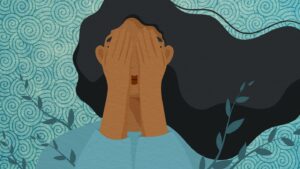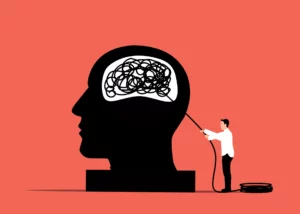Millions of people around the world suffer from chronic pain and depression. These two conditions often go hand in hand, as those who are in pain are more likely to experience depression and vice versa. In this blog post, we will explore the reality of living with both chronic pain and depression. We will discuss the symptoms of each condition, as well as ways to manage them both. If you or someone you know is struggling with chronic pain and depression, please know that you are not alone. There is help available, and there is hope for a better future.
Contents
Defining Depression
 Depression is one of the most common and debilitating mental health conditions. It is characterized by persistent feelings of sadness, hopelessness, and worthlessness. Depression can also cause physical symptoms such as fatigue, insomnia, and pain. People with depression often have difficulty functioning in their everyday lives.
Depression is one of the most common and debilitating mental health conditions. It is characterized by persistent feelings of sadness, hopelessness, and worthlessness. Depression can also cause physical symptoms such as fatigue, insomnia, and pain. People with depression often have difficulty functioning in their everyday lives.
Depression is also more than just merely a low or sad mood. Most people experience sadness or low moods at some point in their lives. Depression is different in that it is more than just a phase and can last for weeks, months, or even years. It can also be caused by chemical imbalances in the brain.
Defining Chronic Pain
Chronic pain, on the other hand, is defined as pain that lasts for more than 12 weeks. It can be caused by a variety of factors, including injuries, diseases, and conditions. Chronic pain can be extremely debilitating, making it difficult to perform everyday tasks. It may also lead to feelings of depression and anxiety.
There are also various disorders relating to chronic pain. Fibromyalgia, for example, is a condition that causes widespread pain and fatigue. Migraines are another type of chronic pain disorder that can cause severe headaches and nausea.
Link Between The Two Conditions
There is a strong link between chronic pain and depression. This can happen due to a variety of reasons.
Psychological connection
For one, chronic pain can be extremely debilitating, making it difficult to do everyday activities. This can lead to feelings of hopelessness, sadness, and worthlessness. Additionally, chronic pain can also cause physical symptoms such as fatigue and insomnia. These symptoms can also contribute to depression.
Another reason for the link between chronic pain and depression is that chronic pain can be an isolating experience. Those who suffer from chronic pain often feel like they are the only ones going through it. This isolation can lead to feelings of loneliness and despair.
Moreover, chronic pain can also make it difficult to maintain relationships. This is because chronic pain can cause a person to withdraw from social activities and hobbies that they once enjoyed. When people withdraw from their loved ones, it can lead to feelings of depression.
Lastly, the link between chronic pain and depression can also be due to the fact that chronic pain is often unpredictable. This unpredictability can cause a lot of anxiety, which can lead to depression.
Physiological connection
As we already know, our body and brain are interconnected. This means that when one part of the body is in pain, it can affect the whole body – including the brain.
There are certain areas of the brain that are responsible for processing pain signals. When these areas of the brain are constantly being stimulated by pain signals, it can lead to changes in the brain. These changes can then lead to depression.
Additionally, chronic pain can also cause inflammation throughout the body. This inflammation can also lead to changes in the brain and contribute to depression.
Moreover, there are many health conditions such as fibromyalgia and migraines that are associated with both chronic pain and depression. This is likely due to the fact that these conditions cause changes in the brain that lead to both chronic pain and depression.
The symptoms of physical health conditions can also cause a person to be in chronic pain. For example, the symptoms of arthritis can include pain, inflammation, and fatigue. These symptoms can then lead to depression.
Can One Disorder Lead To Another?
 When talking about two health conditions in this way, it can make it seem like one disorder always leads to the other. However, this is not always the case.
When talking about two health conditions in this way, it can make it seem like one disorder always leads to the other. However, this is not always the case.
There are many people who live with chronic pain who do not suffer from depression. Similarly, there are many people who live with depression who do not suffer from chronic pain.
However, it is important to remember that the two conditions are often comorbid, which means that they can occur at the same time. This is likely because the two conditions share many risk factors, such as genetics and certain life experiences.
It is also important to remember that just because someone has one of these disorders does not mean that they will develop the other. However, it is important to be aware of the risk factors for both conditions and to seek help if you are struggling.
Causes and Risk Factors
As mentioned above, there are many different causes and risk factors for both chronic pain and depression. Some of the most common causes and risk factors include:
- Genetics: There is a strong link between genetics and both chronic pain and depression. This means that if you have a family member who suffers from either condition, you are more likely to develop it as well.
- Certain health conditions: As mentioned above, there are certain health conditions that are associated with both chronic pain and depression. These include fibromyalgia, migraines, and arthritis.
- Life experiences: Certain life experiences can also lead to either condition. For example, trauma or abuse can lead to both chronic pain and depression.
- Brain changes: Changes in the brain can also lead to chronic pain and depression. For example, changes in the areas of the brain that process pain signals can lead to depression.
If you are struggling with chronic pain and/or depression, it is important to seek help from a mental health professional. They will be able to help you understand your risk factors and develop a treatment plan that is right for you.
Signs And Symptoms
Both the conditions have a lot of similarities as well as differences in their signs and symptoms. A few of the most common signs and symptoms include:
- Fatigue
- Sleep problems
- Loss of interest in activities
- Memory or concentration difficulties
- Mood changes, such as irritability or sadness
- Anxiety or fear
- Unexplained aches and pains
These are just a few of the signs and symptoms that someone may experience if they are living with chronic pain and depression. It is important to remember that everyone experiences these conditions differently, so not everyone will experience all of the signs and symptoms listed above.
Effects On Life

Anything that effects our mind and body can have a big impact on different areas of our life. This is especially true for chronic pain and depression, as they can both have a significant impact on our physical, mental, and emotional health. Some of the ways that chronic pain and depression can effect our life include:
- Work: Chronic pain and depression can make it difficult to work. This is because the symptoms of both conditions can make it hard to concentrate, remember things, and stay motivated.
- Relationships: Both chronic pain and depression can also have a negative effect on our relationships. This is because the symptoms of both conditions can make us withdrawn, irritable, and short-tempered.
- Daily activities: The symptoms of chronic pain and depression can also make it hard to do everyday activities. This is because the fatigue, aches and pains, and mood changes can make it hard to get out of bed, let alone leave the house.
- Hygiene: The symptoms of chronic pain and depression can also make it hard to take care of our hygiene. This is because the fatigue and aches and pains can make it hard to take a shower or get dressed.
If you are struggling with chronic pain and/or depression, it is important to seek help from a mental health professional.
Tips To Manage
Fortunately, there are a number of things that you can do to manage the symptoms of both chronic pain and depression.
Self Help Tips
Self help is undoubtedly the most important thing that you can do to manage chronic pain and depression. This is because it is something that you have control over.
Some self help tips that may be helpful include:
- Exercise: Exercise releases endorphins, which can help to improve mood and reduce pain.
- Healthy diet: Eating a healthy diet can help to improve mood and energy levels.
- Stress management: Stress can make chronic pain worse, so it is important to find ways to manage it. This can include things like yoga, meditation, and deep breathing exercises.
- Sleep: Getting enough sleep is important for both physical and mental health.
- Connect with others: Isolation can make your condition worse, so it is important to connect with others. This can be done through things like social media, support groups, or therapy.
- Self-care: It is important to take care of yourself both physically and emotionally. This can include things like getting a massage, taking a bath, or reading a good book.
- Journaling: Writing down your thoughts and feelings can help to reduce stress and improve your mood.
All these tips contribute to easing one’s chronic pain and depression.
Professional Help
 If you are struggling to manage your chronic pain and/or depression, it is important to seek professional help. This is because a mental health professional will be able to assess your individual situation and develop a treatment plan that is right for you. This may include things like medication, therapy, or a combination of both.
If you are struggling to manage your chronic pain and/or depression, it is important to seek professional help. This is because a mental health professional will be able to assess your individual situation and develop a treatment plan that is right for you. This may include things like medication, therapy, or a combination of both.
Medication is typically used for the treatment of chronic pain and depression include:
- Pain medication: This can be used to help manage chronic pain.
- Antidepressants: These can be used to help treat depression.
- Anti-anxiety medication: This can be used to help manage anxiety.
Therapy is another effective treatment for these conditions. Some types of therapy that may be helpful include:
- Cognitive behavioral therapy: This type of therapy can help to change negative thinking patterns.
- Interpersonal therapy: This type of therapy can help to improve communication and social skills.
- Psychodynamic therapy: This type of therapy can help to address the underlying causes of chronic pain and depression.
If you are struggling with either condition, it is important to seek professional help. There are a number of effective treatments available to guide you.
Alternative Treatments
Besides therapy, there are also a number of alternative treatments that may be helpful for chronic pain and depression. Some of these include:
- Acupuncture: This is a traditional Chinese medicine practice that involves inserting thin needles into the skin.
- Aromatherapy: This is a therapy that uses essential oils to improve mood and reduce stress.
- Massage: This is a therapy that uses touch to relax the body and mind.
- Yoga: This is a type of exercise that combines physical activity with breathing and meditation.
- Biofeedback: This is a therapy that uses technology to help people learn to control their body’s response to stress.
Chronic pain and depression are two conditions that can have a significant impact on your life. If you are struggling with both, it is important to seek help from a mental health professional. Some studies and research have found that the key to managing both chronic pain and depression is to treat them both at the same time. This is because treating one condition can often make the other condition worse. For example, if a person only treats their chronic pain and not their depression, they may find that their depression gets worse. Similarly, if a person only treats their depression and not their chronic pain, they may find that their chronic pain gets worse.
Conclusion
Conclusively, we can say that chronic pain and depression can be difficult to live with, but there are a number of effective treatments available. If you are struggling, it is important to seek professional help. There is no shame in seeking help, and doing so can improve your quality of life.
If you or someone you know is looking for psychological help, Therapy Mantra is here for you. We are the leading providers of online therapy and counseling. Our team of highly trained and experienced therapists can provide assistance at the most affordable rates. Contact us today to learn more about our services. You may also visit our website to book an online therapy session or download our free Android or iOS app for more information.


